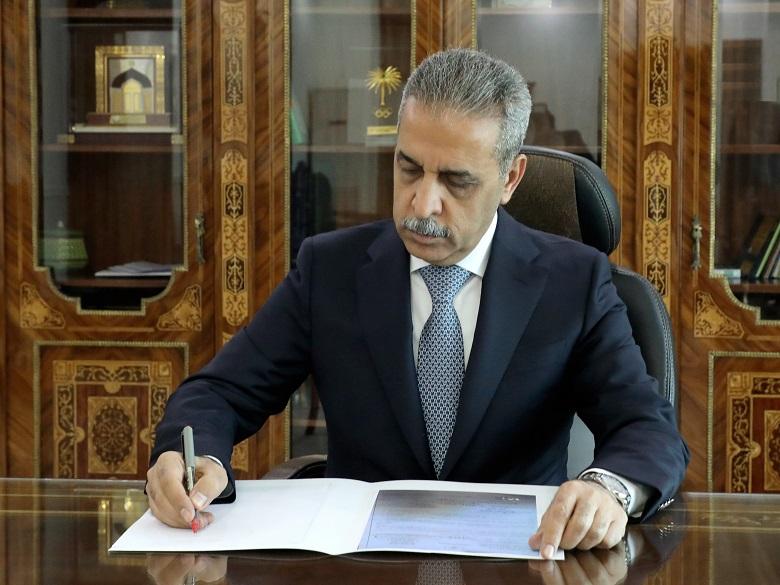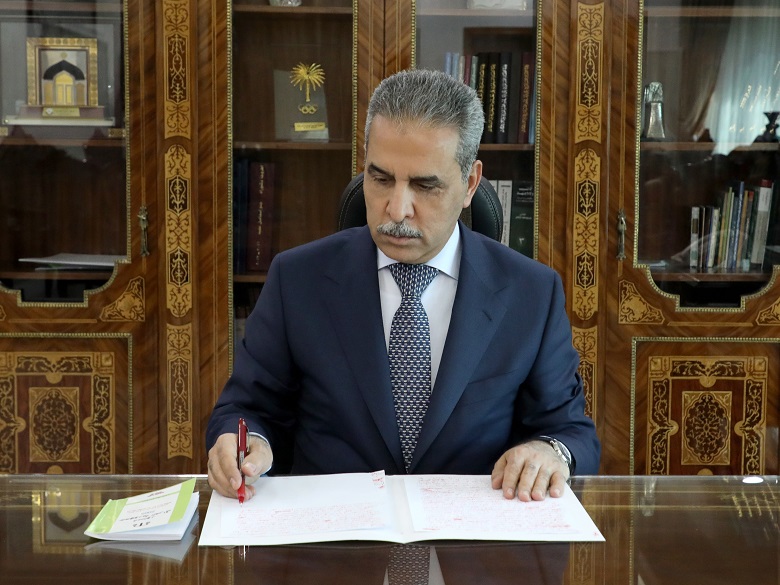
The Federal Supreme Court…. Difficult Birth
PhD Judge Faik Zaydan
Order No. (30) of 2005 is the interim law of the Federal Supreme Court until the legislation of the original law stipulated in article (92/2nd) of the Constitution, whose legislation has been stalled since the constitution came into force and has so far been hampered by disagreements over two main points, the first concerning the composition of the court and the second by the issuance of its decisions.
Referring to the article (92/2nd), it stipulates that (The Federal Supreme Court shall be made up of a number of judges, experts in Islamic jurisprudence and legal scholars, whose number, the method of their selection, and the work of the Court shall be determined by a law enacted by a two-thirds majority of the members of the Council of Representatives) and there have been two trends regarding the composition of the first court, which considers that the court consists of Three categories are judges, experts of Islamic jurisprudence and jurists, all of whom are original members of the court who treated by the same treatment, but the second trend considers that the formation of the court consists of judges only, but the experts of Islamic jurisprudence and jurists, their role is advisory only to provide experience in their field of competence when requested by the court, as in the civil courts that use experts in various specialties.
The second point of contention relates to the outcome of the court's decisions, as some have argued that the court, like any court consisting of a committee or a number of judges, issues decisions either by unanimity or by a simple majority (more than half of its members). The second view was that the court issued decisions with some kind of privacy, so it must be following a certain majority, such as two-thirds, such as in the text of the article (5/1) of Order No. (30) Of 2005 regarding disputes between the federal government and the governments of regions, governorates, municipalities, and local administrations. A third view was that some members of the court had veto power and without their consent, the decision was not issued by the court on certain matters.
These differences of opinion, regardless of the justifications of their owners and our agreement or disagreement with them, have thwarted all attempts to legislate the origin of the Law of the Federal Supreme Court and we believe that this failure to legislate this law will continue, especially with the requirement (attendance and approval) of a two-thirds majority of the members of the Council of Representatives on this law, especially the quorum in the presence of a majority of two-thirds of the members of the Council is not enough to legislate the law, but this attendance must be accompanied by the approval of a majority of two-thirds of the members of the Council of Representatives.
Because of these problems, Order No. (30) Of 2005 continued to be implemented although it was an interim law that was supposed to end with the enforcement of the Constitution and the formation of an alternative court following the provisions of article (92) of it, and further complicated by the decision of the Federal Court No. (38/2019) on 21 May 2019, under which the Higher Judicial Council revoked the power to nominate the president and members of the Court, thus entering the constitutional judiciary in the phase (constitutional vacuum). We have already warned of it on more than one occasion, but unfortunately, some interpreted this position incorrectly until the one we warned about by referring a member of the Court to retirement at his request was forced to have his ill health and then his death and the death of another member, so he disrupted the quorum of the court because article (5/1) of Order No. (30) Of 2005 required the validity of the court to attend all its members, which are following law (9).
Then the judiciary entered into another crisis by trying to avoid the error caused by the decision (38/2019) when the President of the Federal Supreme Court appointed a retired judge as an original member of the court without constitutional or legal basis and after a legal dispute and a lawsuit resolved by the civil judiciary the illegality of this appointment, the Presidency of the Republic became aware of this and decided to withdraw the Republican decree under which this member was appointed and the court remained the case of unjustified disruption, and the matter increased seriously as the date of the early elections imposed on October 10, 2021 approached. Article (93/7th) of the Constitution provides for the approval of the results of the elections by the Federal Court, so the House of Representatives found itself faced with a fait accompli that the constitutional vacuum must be addressed in accordance with two options, not a third, either legislation of the origin of the law stipulated in article (92/2nd) of the Constitution or the issuance of the Law amending Order No. 30 of 2005 and finding an alternative text for the text repealed by the Federal Court and determining who is responsible for nominating the president and members of the Federal Court, especially since the two bills ( The original and the amendment) were read first and second and ready for the last vote.
There was a near consensus among the political forces that make up the Council of Representatives on the legislation of the law originally in accordance with the provisions of article (92/2nd) of the Constitution and voted with the approval of a majority of two thirds of the members of the Council of Representatives on eighteen articles out of twenty-four articles until it reached the points of contention mentioned above, so the Supreme Judicial Council presented a proposal to the House of Representatives as a compromise that may be a way out of the bottleneck and the proposal included the consideration of experts of Islamic jurisprudence and jurists as members of the origin besides the judges In two cases that fall within their jurisdiction according to the text of article (2) of the first constitution in case the court hears a case related to a law that is contrary to the principles of Islam and the second in the case of a case related to contrary to the principles of democracy or fundamental rights and freedoms, otherwise the court shall be made up of judges only and despite the complexities and details of the proposal approved by the House of Representatives and the first problem was overcome, but the second problem emerged largely, where some stipulated that if the court considers a case related to article (2) of the constitution, the opinion of the experts of Islamic jurisprudence is dependent on it and the decision is issued according to it, although it is contrary to the opinion of the judges in the sense that if the experts of Islamic jurisprudence object to the decision of the majority of the members of the court of judges, the decision is issued according to the opinion of the experts of Islamic jurisprudence, which led one of the political parties to put another condition in exchange for this condition, which is that the decisions of the court regarding the consideration of a particular case have a few judges of the court the right to object (veto) and the decision is issued only with the approval of these minority judges in the membership of the court.
Here the judiciary felt the danger to the reputation of the Iraqi judiciary at the local, regional and international levels as there is no court in the world to follow this approach in decision-making and this method of decision-making can disrupt the work of the court, so the judiciary made an extraordinary effort in cooperation with those who realized the seriousness of what would happen if these strange ideas of judicial custom were introduced and the judiciary succeeded in persuading the Council of Representatives to go to the second option and legislate the Amendment Law (30) of 2005 In particular, all the articles of the Amendment Law are among the 18 articles of the law, which were approved by a two-thirds majority of the Members of the Council of Representatives after the vote of approval, in addition to the fact that the procedures for the legislation of the Said Amendment Law were suspended on the vote in total approval of this law after all its articles were approved by a single vote and actually voted to approve the legislation of the Amendment Law (30) of 2005 by a simple majority, which we believe is constitutional and enough to legislate the law. The two-thirds majority argued by some goes to the origin of the Federal Supreme Court Law stipulated in the article (92) of the Constitution and not to Order No. (30) Of 2005, which was issued at the time by the Prime Minister by virtue of his legislative authority as well as his executive power before the Constitution came into force.
With the legislation of the Amendment Law No. (30) of 2005, many problems have been treated, the most important of which is the creation of a body specialized in the nomination of a president, vice president and members of the Court, and this body according to the text of article (3/2nd) of the amendment law are the heads of the components of the judiciary stipulated in article (89) of the Constitution and in accordance with the constitutional sequence. In that article (The federal judicial power is comprised of the Higher Juridical Council, the Federal Supreme Court, the Federal Court of Cassation, the Public Prosecution Department, the Judiciary Oversight Commission, and other federal courts that are regulated in accordance with the law), the two gentlemen met immediately after the amendment law came into force on the date of its adoption in the Council of Representatives in accordance with article (8) of the said law and the agreement was chosen a new composition of the court in a judicial atmosphere dominated by the logic of scientific debate and objective evaluation of candidates.
Under the Amendment Law, the problem raised by some was addressed by some regarding the previous Federal Court's response to topics relating to the interpretation of the Constitution, considering that Order No. (30) of 2005 was devoid of the court's jurisdiction, in addition to other jurisdictions that some had denied to the previous court, so article (4) of the Amendment Law was provided for all constitutional jurisdictions provided for in article (93) of the Constitution and other articles to fall within the jurisdiction of the Court.
The inaccuracy of the court's quorum, which may occur in the future for any reason, has also been treated as the reserve judge of the Court was introduced under article (3/Beh) of the Amendment Law.
We did not agree with the Council of Representatives at only one point, which in any case was not impeding the functioning of the Court relating to the retirement age, as article (6/3) of the Amendment Law set the retirement age at 72 years, while we saw that the retirement age should be following the provisions of judicial regulation law No. 160 of 1979 amended and the Justice Extension Law No. 39 of 2012 to be completed (68) years like the judges of the Court of Cassation.
Faiq Zidan
11 April 2021




